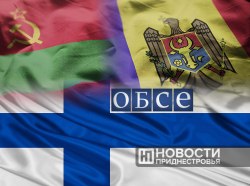98% of Pridnestrovian citizens oppose to the change of the peacekeeping format, according to the data voiced at the international online conference «The peacekeeping operation on the Dniester banks: 25 years of stability and security», which was held in Shevchenko Pridnestrovian State University last Wednesday. 525 Pridnestrovians from all the towns and districts of the PMR took part in the poll was organised by Pridenstrovie's foreign ministry. 92% described the peacekeeping mission as efficient; 85% as reliable; 75% of the respondents consider its structure optimal. 95% of the respondents do not want the US military to be involved in the peacekeeping operation; 95% are opposed to the participation of Nato; 85% are against the EU; 83% are against the UN and 76% do not like the OSCE.
By the way, a few words about the OSCE. In recent months the field mission of the OSCE in Moldova has been actively promoting the idea of the Security Zone being monitored by their observers alongside Russian, Moldovan, Pridnestrovian and Ukrainian military observers. This initiative by the OSCE, as the head of the Pridnestrovian delegation to the JCC, Oleg Belyakov, noted in an interview with Novosti Pridnestrovya, receives active support from the Moldavian side. The idea is not that new. A few years ago, the same was advocated by Ukrainian representatives, who took part in JCC meetings. However, according to experts, any attempts to transform the operation will lead to the disruption of its current format, which is unique and, as Pridnestrovie's foreign minister underscores during a press conference, and serves as a model for all conflict points.
Despite the fact that the OSCE is not a direct participant in the operation, its representatives always attend meetings of the Joint Control Commission (JCC) as well as other peacekeeping events. As Pridnestrovie's former foreign minister and acting presidential representative on relations with Ukraine, Vladimir Yastrebchak, noted, when the peacekeeping operation in Pridnestrovie is criticised over the lack of «internationalisation», it should be recalled that 57 countries of Europe, Asia and North America are OSCE members today.
Among the arguments frequently put forth by the proponents of the discontinuation of the trilateral operation and its replacement with a UN- or OSCE-led observatory mission is the argument about the absence of an international mandate. Those who resort to this kind of argument are either insufficiently informed or consciously cunning. The OSCE's indirect participation has been mentioned above. Moreover, during the conference one of the former heads of the OSCE Mission to Moldova was several times quoted as saying that were the peacekeeping operation unsuccessful, the OSCE would have never joined it. As for the UN, it had once considered the issue of a peacekeeping mandate in Pridnestrovie, South Ossetia and Abkhazia, but it was finally decided to grant the right to stabilise these local conflicts as the Soviet successor. The UN made lots of such decisions. In addition to UN missions, many operations are being led now by the OSCE, EU, Nato, continental and international organisations in various parts of the world. For example, the Inter-African Peacekeeping Forces were often used in Africa, and the navies of Nato states, Russia, China, India and other countries in the region were struggling independently against the notorious Somali pirates. All this was sanctioned by the UN Security Council.
A special peacekeeping formula was adopted for each of them. The involvement of a contingent of one conflicting party in the peacekeeping activities took place first during the Georgia-Ossetia conflict, while the servicemen of both warring sides were first involved in Pridnestrovie. The peacekeeping operation in Abkhazia was carried out under the CIS mandate. However, only Russian peacekeepers took part in it, but it was the common will of the heads of CIS countries, including the Georgian one. During an online conference, which was held on Wednesday in PSU, the Pridnestrovian foreign minister, Vitaly Ignatyev, recalled, referring to the «lack» of international mandate, that UN experts had visited the region. «They concluded that the peacekeeping operation complied with international standards.»
An important feature of this conference was that both the present head of the Pridnestrovian delegation to the Joint Control Commission (JCC), Oleg Belyakov, and his three predecessors took part in it: Vladimir Rylyakov, Vladimir Bodnar and Alexander Porozhan. Thus, Oleg Belyakov noted that over two years the JCC had managed to settle over 50 incidents in the Security Zone, each of which might escalate into a conflict under certain conditions. He underscored, in the meantime, that Kishinev had been taking more and more attempts to disrupt the existing peacekeeping mechanisms. This applies not only to Kishinev's top officials but also to the Moldovan officials who are directly involved in the JCC's work.
One of the tangible attacks on the peacekeeping mission is, according to Belyakov, the blockade by Moldova of the conduct of joint peacekeeping exercises. Previously, such exercises were conducted twice a year, but the last time they were organised in April 2013. It should be recalled that the history of the peacekeeping operation saw a period when the Moldovan side was boycotting all joint peacekeeping activities. It is noteworthy that this was also the case in the area of the Georgia-Ossetia conflict, which resulted in Tbilisi's defeat in the Five-Day War of 2008. By the way, Georgia must share blame for the events of August 2008 in South Ossetia with the mission of international observers who missed the concentration of Georgian troops. It turned out that tanks and multiple rocket launchers are a needle in a haystack. The OSCE mission worked there independently of the Joint Peacekeeping Forces. Something similar, as stated above, is proposed for the Moldo-Pridnestrovian conflict. Although Pridnestrovians remember the end of the mission of civilian observers from Russia, Moldova, Ukraine and Romania, working in Bendery in April — July 1992. Moldovan and Romanian observers had «evaporated» the day before the Moldovan army and police invaded the city, and their Russian and Ukrainian colleagues were evacuated under fire.
A few words about Ukraine's participation in the settlement of the Moldo-Pridnestrovian conflict. Kiev does not renounce its status as a guarantor and mediator in the negotiating process and as a participant in the peacekeeping operation. On the other hand, Ukraine, together with Moldova, has been exerting pressure on Pridnestrovie since 2006. Not long ago it denounced its agreements with Russia on the transit through its territory of goods for the Russian peacekeeping contingent. At the same time, Moldova has begun to hinder the rotation of Russian peacekeepers. The synchronism of activities is obvious. Just as it was clear in 2006 — 2008 when Georgian and Moldovan peacekeepers boycotted «independently» of each other all activities carried out within the corresponding operations. Kishinev resumed peacekeeping work only after Georgia was defeated in the Five-Day War.
Kiev's broader representation in the peacekeeping operation was once discussed. Vladimir Bodnar and Alexander Porozhan spoke about negotiations to involve Kiev into the operation. It was a joint initiative of Kishinev and Tiraspol. Moldova and Pridnestrovie requested Kiev to deploy a battalion of Ukrainian servicemen in the conflict area. Ukraine began to consider the money, although at the time its soldiers performed peacekeeping duties in a very distant country. But unlike the Joint Peacekeeping Forces, UN operations brought impressive infusion in the budget, which has always been a source of profit for small and poor countries. But even Kiev's current participation in the operation in the form of 19 military observers is also significant, in the unanimous opinion of the conference participants. Ukraine is deemed a full-fledged participant in the operation, which makes the statements of many Ukrainian politicians about the «Russian occupation of an integral part of Moldova» even funnier.
As mentioned above, it was an online conference. Russian experts were able to take part in it remotely. In particular, Sergey Markedonov, a senior lecturer at the department of foreign policy of Russian State Humanitarian University, who has repeatedly visited our republic and other conflict zones, gave a positive assessment of the ongoing peacekeeping operation. In addition to supporting the common view of conference participants about the uniqueness and efficiency of the operation, the expert also noted 25 years ago it had saved Moldova itself which experienced a period of internal instability. The same, according to the Russian scientists, refers to Georgia, which agreed rather quickly to a Russia-led peacekeeping operation in the zone of the Georgia-South Ossetia conflict. «Many say today, especially in European countries, that Russia has 'failed to do this or that.' Like a total failure. But in 1992 not only pro-Russian forces — Pridnestrovie and South Ossetia — heeded this 'failure': Georgia and Moldova were awaiting a plan for a peacekeeping operation developed by Russia," said Markedonov.
The conference ended with the adoption of a resolution in which, inter alia, it was stated that the trilateral peacekeeping mechanism, which has worked for 25 years, «is a vivid example of the fact that international peacemaking can be effective if the realia of the conflict and the interests of the parties involved are respected.» The conference called on the leadership of Moldova and Ukraine «to reconsider the discriminatory logic of interaction with Pridnestrovie, to stop the implementation of pressure measures, as well as steps aimed at shattering the existing peacekeeping structure, to take measure to stabilise the JCC's work.»
The resolution has also a paragraph concerning us, the journalists, which says: «The conference participants invite the journalist and expert communities of Pridnestrovie, Moldova and Ukraine to seek comprehensive and objective coverage of the peace process, highlighting the unique tripartite format of the peacekeeping operation in Pridnestrovie.» That's what we are actually doing.
Anton Yegorov








